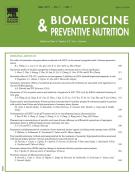Impact of quercetin on PCBs (Aroclor-1254)-induced impairment of dopaminergic receptors expression in hippocampus of adult male Wistar rats - 01/03/13

Abstract |
The present study is aimed to evaluate the putative neuroprotective effect of quercetin on PCBs-induced impairment of dopaminergic receptors expression in hippocampus of adult male Wistar rats. Group 1 control rats were injected with corn oil (80μL) intraperitoneally (i.p). Group 2 rats received quercetin by gavage at a dose of 50mgkg−1bwt. Group 3 rats received i.p. injection of Aroclor 1254 at a dose of 2mgkg−1bwt and group 4 rats were administered with Aroclor 1254 at a dose of 2mgkg−1bwt (i.p.) and simultaneously quercetin was supplemented by gavage at a dose of 50mgkg−1bwt. Twenty-four hours after the 30th day treatment rats were euthanized. From each rat, hippocampal tissue was collected and analyzed the levels of oxidative stress markers – hydrogen peroxide generation, protein carbonyl content, lipid peroxidation. To confirm PCBs impairment on dopamine signal transduction, the levels of ATPases, serum essential elements and mRNA expression of Cacna1d were analysed. The fates of the mRNA and protein expression of dopaminergic receptors, rate-limiting enzyme TH were studied by RT–PCR and immunoblot respectively. The PCBs-induced neurodegeneration was assessed by histological studies. Results proclaim that PCBs disturb dopaminergic receptors and also causes neurodegeneration in hippocampus via production of ROS. Simultaneous quercetin treatment had scavenged the free radicals induced by PCBs and protected dopaminergic receptors dysfunction in rat hippocampus.
Le texte complet de cet article est disponible en PDF.Keywords : PCB, Oxidative stress markers, Dopaminergic receptors, Quercetin
Plan
Vol 3 - N° 1
P. 42-52 - janvier 2013 Retour au numéroBienvenue sur EM-consulte, la référence des professionnels de santé.
L’accès au texte intégral de cet article nécessite un abonnement.
Déjà abonné à cette revue ?

